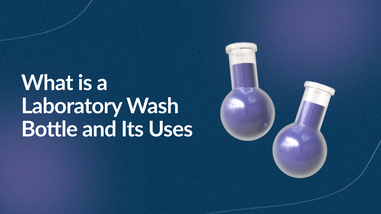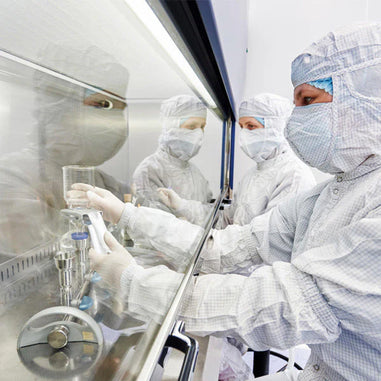- No products in the cart.
Ensuring access to safe drinking water is a fundamental public health goal. Water treatment laboratories play a pivotal role in achieving this by employing various purification methods and advanced technologies. This blog delves into the science behind water purification, the technologies used in laboratories, and the crucial role of laboratory supplies and chemicals in these processes. We will also highlight how Lab Pro stands as a leading expert in providing lab supplies for water treatment plant laboratories.
The Importance of Water Purification
Water purification is essential to remove contaminants that can pose serious health risks. Contaminants in water can include bacteria, viruses, heavy metals, chemicals, and other pollutants. Consuming contaminated water can lead to a host of health issues, including gastrointestinal illnesses, reproductive problems, and neurological disorders. Therefore, ensuring that drinking water is free from harmful contaminants is critical for public health.
Methods of Water Purification
Water purification involves several processes, each targeting different types of contaminants. Here are some of the primary methods used in water treatment laboratories:
-
Filtration: Filtration is the process of removing particles from water by passing it through a porous material. Common filtration methods include sand filtration, activated carbon filtration, and membrane filtration. Each type of filtration targets different sizes and types of contaminants, from large particles like sand and silt to smaller particles like bacteria and viruses.
-
Coagulation and Flocculation: These processes involve adding chemicals (coagulants) to water to facilitate the clumping together of suspended particles into larger aggregates (flocs), which can then be more easily removed. This method is particularly effective in removing fine particles, organic materials, and certain types of metals.
-
Sedimentation: Following coagulation and flocculation, sedimentation allows the heavy flocs to settle at the bottom of a treatment tank, from where they can be removed. This process helps in reducing the turbidity of the water.
-
Disinfection: Disinfection is the process of killing or inactivating pathogenic microorganisms. Common disinfectants include chlorine, chloramine, and ozone. Ultraviolet (UV) radiation is also used as a disinfection method. This step is crucial for ensuring that water is microbiologically safe to drink.
-
Ion Exchange: Ion exchange processes are used to remove undesirable ions from water, such as hardness ions (calcium and magnesium) and heavy metals. This is typically done using resins that exchange harmful ions for less harmful ones.
-
Reverse Osmosis: Reverse osmosis (RO) is a membrane filtration process that removes a wide range of contaminants, including dissolved salts, organic molecules, and microorganisms, by forcing water through a semi-permeable membrane. This method is highly effective and is often used for desalination and in situations where high-purity water is required.
Technologies Used in Water Treatment Laboratories
Water treatment laboratories utilize a variety of advanced technologies to ensure the efficacy of purification processes:
- Spectrophotometers: These instruments measure the intensity of light absorbed by a sample, helping in the detection and quantification of various contaminants.
- Chromatography Systems: These are used to separate and analyze complex mixtures of chemicals in water.
- Mass Spectrometers: These instruments identify and quantify trace levels of contaminants with high precision.
- Microscopes: Essential for identifying and studying microorganisms in water samples.
- Automated Titration Systems: These provide accurate measurement of chemical concentrations in water samples.
Essential Laboratory Supplies and Chemicals
The effectiveness of water purification processes heavily relies on the availability of high-quality laboratory supplies and chemicals. Here are some of the essentials:
- Filtration Equipment: This includes sand filters, activated carbon filters, and membrane filters of various pore sizes, essential for different stages of filtration.
- Reagents for Chemical Treatments: Coagulants like aluminum sulfate and ferric chloride, flocculants, and disinfectants such as chlorine and ozone are critical for the chemical treatment of water.
- Advanced Spectrometers: Devices like UV-Vis spectrophotometers and atomic absorption spectrometers are used for detecting and quantifying contaminants.
- Sample Containers and Collection Kits: Sterile containers and kits are necessary for collecting water samples without introducing contamination.
- pH Meters and Buffers: Accurate pH measurement is crucial in many stages of water treatment.
Lab Pro: Experts in Lab Supplies for Water Treatment Plant Laboratories
Lab Pro stands out as a leading provider of laboratory supplies for water treatment plant laboratories. With decades of experience, Lab Pro offers a comprehensive range of products tailored to meet the specific needs of water treatment professionals. From high-quality filtration equipment and advanced spectrometers to reliable reagents and sample collection kits, Lab Pro ensures that laboratories have access to the best tools and materials to guarantee safe drinking water.
Lab Pro’s commitment to quality and customer satisfaction makes it a trusted partner for water treatment laboratories. Their expertise in the field ensures that laboratories are well-equipped to tackle the complex challenges of water purification, thereby safeguarding public health.
Conclusion
Water purification is a critical process that ensures the safety and quality of drinking water. Through various purification methods and advanced technologies, water treatment laboratories play a vital role in protecting public health. The use of essential laboratory supplies and chemicals is fundamental to the success of these processes. With the support of experts like Lab Pro, water treatment laboratories are well-equipped to meet the highest standards of water safety and quality.
For over 45 years, Lab Pro Inc. is your steadfast source for lab chemicals, premium cleanroom wipes, hand tools, lab equipment, and PPE apparel. Trusted by water treatment labs, medical device companies, and laboratories globally, we epitomize exceptional quality in every product. Experience the convenience of next day service in California. Contact us online or at 888-452-2776 to explore solutions tailor-made for the laboratory industry. Elevate your experiments with Lab Pro Inc. – your partner in precision and excellence.












































